Prelude
Let's hop off that two-edged sword of discernment for a moment ((it can be really, really sharp!), stuff it in our backpack and take a stroll into the landscape of the Imaginal. But, one may ask, how do we get to that terrain in the first place? Here we are in our day-to-day real world, paying bills and making lunch and driving to work; the thousands of mundane and often irritating tasks in that shared world which constantly draw our attention, feed our anxieties, lure our desires. Getting from the here and now of phones and computers, news and gossip, risks and responsibilities, to the Imaginal Realm seems at the least daunting, at most a pipe dream.
Putting aside the obvious fact that we go into the Imaginal naturally every night in our dreams, we'll have to look for hints and clues, perhaps even obtain a roadmap to help us on our journey. But even with a roadmap in hand we will need a vehicle, a means of transport. There is a clue available for us on that quest - that symbol that the Imaginal Realm passed on through the dream I referred to, the one that initiated this discussion. Namely, the white tuxedo. In that regard I'll reach back into my backpack and snag that black bow tie of discernment again (if you're gonna wear a tuxedo you're gonna need a bow tie), and... voila!!... all dressed up with everywhere to go.
I spoke in a previous posting of the possible symbolic associations that a tuxedo engenders. There is one I hinted at yet somehow couldn't quite nail on the head at the time, and it's that association I want to explore more clearly now, the one I'm hoping will possibly transport us to our destination. I'm talking here about an important clue the symbolic tuxedo gives us - the notion of ritual.
Fugue
One very common use of the term "ritual" is, simply put, habitual action. I have a morning ritual - I get out of bed, make a pot of coffee, turn on my computer and bring up a weather site. This happens pretty much every morning without thought. It's a simple routine without mysterious meaning or depth, yet it serves a function - the coffee perks me out of the night's slumber, the weather report helps me plan what I will wear that day, how my intended goals will be effected by rain or snow, cold or heat. I imagine we all have many such rituals throughout the day, rituals we hardly notice.
At the other end of the spectrum is my dictionary's primary definition of ritual - a religious or solemn ceremony consisting of a series of actions performed according to a prescribed order. This type of ritual might simply be for some a method to bring a community together, a bonding, or a networking tool of sorts. It might, for those so inclined, actually trigger an Imaginal experience - a vision of Jesus or Mary at church; a conversation with spirit guides during a peyote ceremony in a sweat lodge; an eruption of bliss and ecstasy while chanting mantra on a yoga mat. These are all legitimate forays into the Imaginal Realm, usually by individuals though occasionally shared by many or most of the community in attendance.
In any case, it's a prescribed event with rules and methods, sometimes evolved and formulated over eons of traditional practice, and which by the nature of repetition can become nothing more than habitual action, remaining on the level of a networking event, a fun Friday night psychedelic trip with buddies, a soothing chant during meditation to help relieve anxiety and lower blood pressure ( all legitimate activities, but not forays into the Imaginal).
Between semi-conscious habitual actions (like my morning ritual) and prescribed ceremonial actions (like ingesting peyote in a sweat lodge) lie a whole range of ritual-like activities. After my morning ritual I oftentimes engage in a series of what is popularly known as yoga exercises. My intent is very particular in this regard. I'm not a student of Hatha Yoga, in which case these exercises might be a very solemn affair among other practices with the intent of achieving Satori, or Moksha, or Kundalini activation. Rather, I simply want to take care of the body, make it more limber and agile in its actions within the world. I have a book describing these exercises in word and picture, and these are indeed prescribed instructions I follow. In this case the ritual also engages a process, in that repeated sessions over time gradually achieve my aims. Yet in no way am I looking to explore the Imaginal Realm through these methods.
At least not as a primary process. There is a secondary process that seems to tag along in parallel on its own. When I'm done with the exercises I'm more relaxed yet highly focused, more open and receptive in the sense of beginner's mind. This changed state of being just might, at times, open doors to the Imaginal. A similar thing happens when I go to the gym 3 or 4 days a week. I perform the prescribed activities dictated by the various machines, ritually following a specific order every time. Once again the primary process is oriented toward the body, to improve strength and endurance so as to to increase effectiveness in the world. Like yoga I come out focused, relaxed, etc. (though I have yet to exit the gym to see faeries dancing in the evening sky).
All of these actions I've described are prescribed rituals, whether religious or secular, Imaginally purposed or practical. They have their structures presented to the practitioner by a traditional institution of one sort or another, the parameters developed within a culture over time. Sometimes they achieve their goals, sometimes not. Sometimes they have secondary processes at work, sometimes not. But what if you were to endeavor to develop unique rituals for yourself, rituals not handed down to you by the Upanishads or Planet Fitness, especially if your purpose was to create a vehicle to transport you to the Imaginal Realm? How would you start?
To be continued....
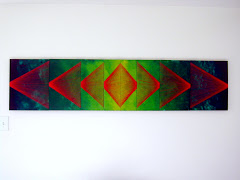

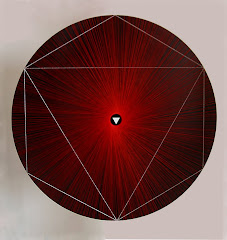
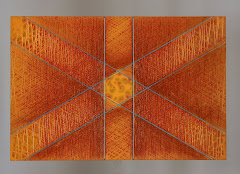
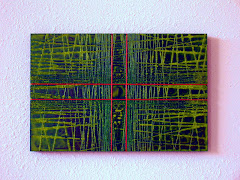
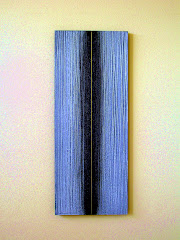.jpg)